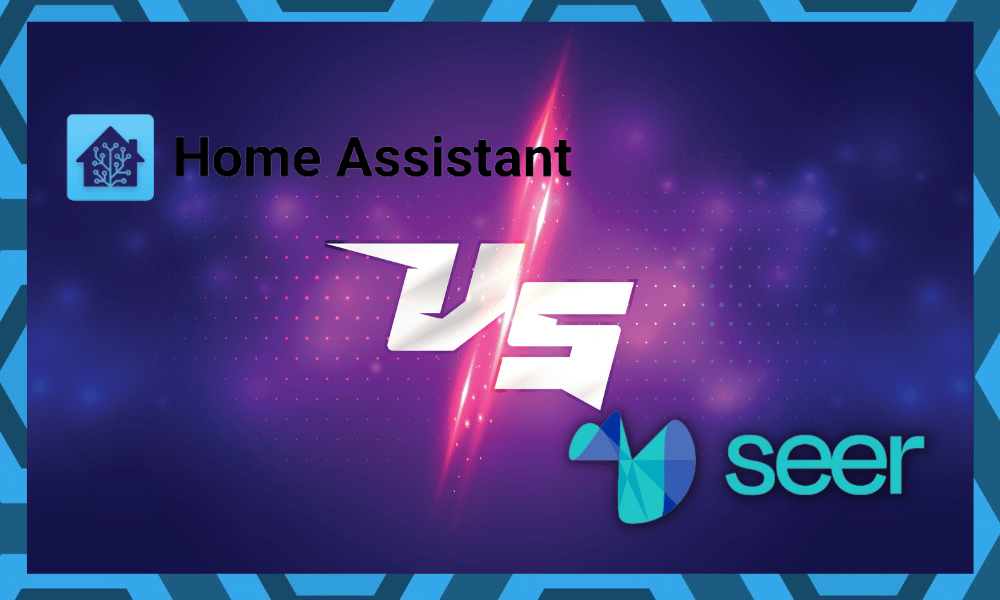
Smart home technology has brought in plenty of improvements in our house. They have helped improve various aspects of our lives by bringing us more control over how we control our gadgets.
Now, we can remotely control and monitor all the appliances in our smart home.
There is no debate that you will have to spend a bit of extra budget on these items. However, the performance of these units is simply out of this world.
You can find many amazing brands like Philips, Govee, and Nanoleaf when developing your lighting.
Similarly, owners like to rely on options like Home Assistant and Homeseer to further optimize their smart systems.
These devices have been long in the market when it comes to automation, and there are no better alternatives available to the owners.
Home Assistant vs Homeseer
When talking about smart home companies, Home Assistant and Homeseer are two of the most acclaimed names. Both of them are highly competitive and provide plenty of benefits to the user.

This is also why we can see people make a comparison between Home Assistant vs Homeseer.
Today, we will be comparing Home Assistant and Homeseer with each other. We will be going through all the important aspects of both of these smart companies.
So, if you want to learn more about what these smart companies are about, then we suggest you keep on reading!
| Specifics | Home Assistant | Homeseer |
| Setup | Moderate | Simple |
| Dashboard | Detailed | Moderate |
| Convenience | Moderate | Amazing |
| Reliability | Phenomenal | Phenomenal |
| Customer Preference | Moderate | High |
When you’re trying to develop the perfect system, it can be pretty challenging to find the right fit.
You’ll have to spend a bit of time matching the features offered by one unit with your requirements and then go about finalizing the system accordingly.
As good as it might sound, there is no such thing as one perfect system for all houses or owners. So, you will have to figure out which system best suits your needs.
This is especially true if you’re new to the market and don’t know much about smart systems.
Most of the time, you will find that beginners are better suited to the HomeSeer system. This brand has long been dominating the market when it comes to simple setups and easier controls.
You will be able to perfectly manage your setup without dealing with complex setup cycles.
However, one downside here is that the HomeSeer is not that great when it comes to the data dashboard when compared with Home Assitant.
While there is no doubt that you will get complete information, the details are just missing across some metrics.
So, you need to keep that in mind if you’re aiming for a decent level of control over your units.
This doesn’t mean that the HomeSeer system is inferior. Instead, it is not suitable for some of the owners that are looking for a more detailed dashboard for their smart system.
Other than these minor complications with the dashboard, you will find that the HomeSeer is the better option for you.
The reliability is great, the convenience is better, and the customer preference is pretty high. Moreover, you will not have to spend too much cash when sticking with this option.
Here are more details on this system to help you finalize the purchase.
Home Assistant
Home Assistant is an open-source smart home that gives users the option of automating their homes in a different smart house.
The interesting thing about Home Assistant is that it was made by a bunch of innovative DIY enthusiasts and is also designed to run perfectly on Raspberry Pi.
Home Assistant is compatible with most of the appliances that you can think of. To take a few examples, KODI, PLEX, IKEA, Ecobee, and Hue are all supported by Home Assistant.
This means that you can safely run Home Assistant on most of the smart devices and appliances that you run on it.
Through a single device, you get to have control over each and every one of your appliances.
All you have to do is to install the app on your phone through which you are allowed to have control over your smart house as well as store data in the cloud.
You can also expect to enjoy advanced automation features using Home Assistant.
You can successfully set up basic as well as advanced rules for your devices in order to have better control over them.
Whether you want any particular light to turn on/off during a specific time of the day or do something completely different, Home Assistant will help you achieve it.
It is also important to mention that you can store your data locally using Home Assistant, which means that you won’t have to worry about losing your valuable data that easily.

It is one of the best pros for having either the Home Assistant or the HomeSeer systems in your house.
One of the most common and annoying errors with smart units is losing up on the network connection. Luckily, you will not have to worry at all about that when you’re sticking with these options.
The reliability is great, and you will get complete control even when the network is a bit patchy.
Moreover, all of the automation routines and setup cycles will work perfectly.
It all comes down to the configurations you’ve managed previously. If you’re sure that there are no errors with the setup configurations, then getting a good response from the system is not that hard of a job.
Hopefully, you will have an amazing time when it comes to setting up the Home Assistant in your house.
HomeSeer
HomeSeer is another great option for home automation that focuses more on providing the user with features that are reliable, private, instantaneous as well as safe to perform.
Through HomeSeer, users are allowed to do plenty of things effectively without having to worry much.
Just like Home Assistant, the user is allowed to save all of his data locally. This means that even when the user is facing issues with his internet, he will still be able to get his smart home to function offline.
All of the events, automation, and scenes will run even when the internet is down.
Using HomeSeer, you can make home automation much smarter than it already is.
At your convenience and liking, you can have control of all your lights and garage doors, as well as the temperature inside your house and much more!
What’s even better is that HomeSeer is incredibly easy to install. All you need to do is to connect your HomeSeer device to the router and then power it on.
After that, you can add in all the devices that you need to have control over. Once that is out of the way, you can finally start automating to your heart’s content.
While there is no debate that HomeSeer is easier, you will still have to spend a bit of time trying to learn the ins and outs of the process.
You will still be able to figure out all of the configurations on your own and won’t have to rely on an expert.

With that said, if you do manage to get an expert to help you with the system, that is even better.
As long as you have the money for it, getting an expert to help you optimize the system can speed up the process. So, try looking towards some local contractors when you’re aiming for a quick setup.
There are no extensive setup cycles or routines when it comes to managing this system.
Hopefully, you’ll find HomeSeer to be the perfect fit for you and won’t feel the need to switch to any other option down the road.
However, if you’re still confused, we suggest that you involve an expert in the fix.
He will help you avoid a ton of disappointment, and you will not have to bother with as many complications when it comes to setting up the unit.
The Bottom Line:
Comparing Home Assistant vs HomeSeer, here are some of the things that you will need to know if you want to know which one of them is the better option for you.
Hopefully, you will be able to figure out which system serves your needs better.
Both of them come with their own set of advantages and disadvantages. What’s more important is how you want to use home automation in your smart home.
We highly recommend giving the article a thorough read for further details.
The general market sentiment is that HomeSeer is easier to use and provides more control when it comes to setting up the smart system.
If you’re not that experienced and need an easier way in, then going with this option is not a bad idea.
Similarly, when you’re talking about a more extensive data dashboard, Home Assitant has been dominating that sector.
In the end, everything boils down to your requirements. It all comes down to how you’re planning on developing your smart system.





Where are the pros and cons?
was really looking for a review and comparison between the two systems. There is almost no detail here to assist in making a decision